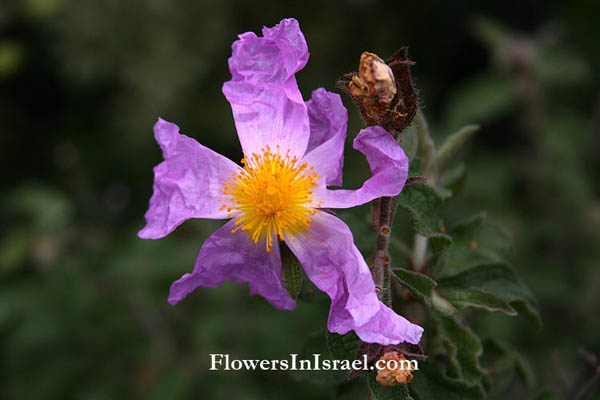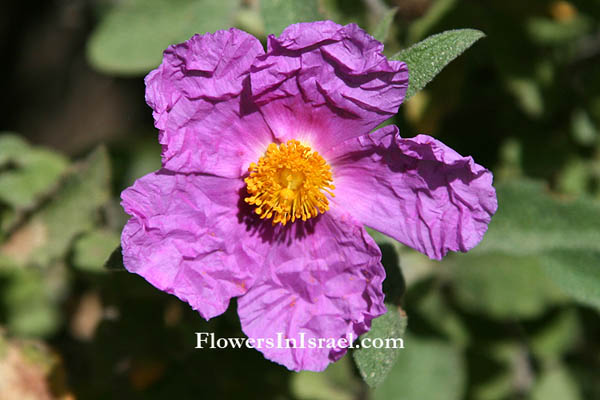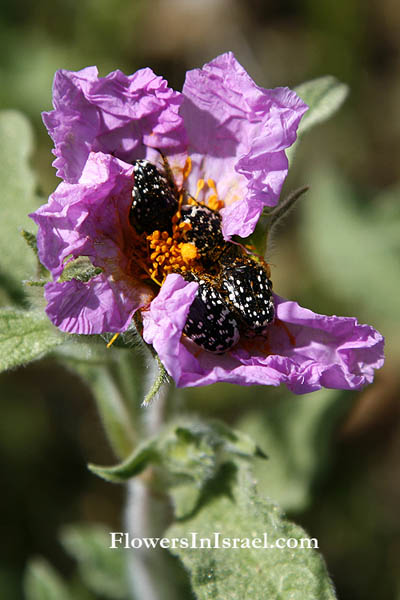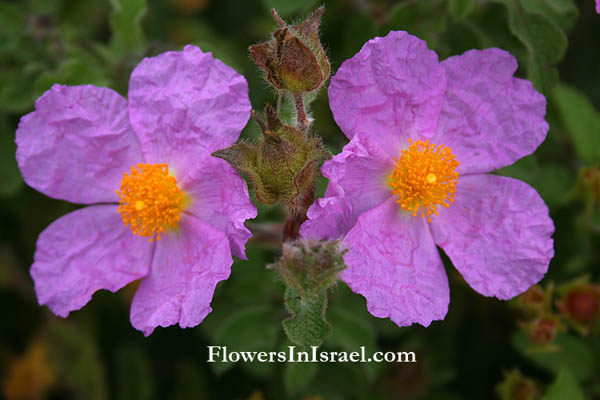Soft-Hairy Rockrose,
Hebrew: לוטם שעיר, Arabic: لبّـاد أحمر
| Scientific name: | Cistus incanus L. | |
| Synonym name: | Cistus creticus L., Cistus villosus L. | |
| Common name: | Soft-Hairy Rockrose | |
| Hebrew name: | לוטם שעיר | |
| Arabic name: | لبّـاد أحمر | |
| Plant Family: | Cistaceae, לוטמיים |

|
| Life form: | Chamaephyte | |
| Stems: | Very much branched, short and crowded, pubescent, sticky stems | |
| Leaves: | Opposite, entire | |
| Flowers: | Pink | |
| Fruits / pods: | Loculicidal capsules | |
| Flowering Period: | March, April, May, June | |
| Habitat: | Batha, Phrygana | |
| Distribution: | Mediterranean Woodlands and Shrublands, Semi-steppe shrublands, Montane vegetation of Mt. Hermon | |
| Chorotype: | Mediterranean | |
| Summer shedding: | Perennating |

Derivation of the botanical name: Cistus, from kisthos or kistos, "the rock-rose" (Carl Linnaeus). incanus, "very gray, hoary". creticus, from the island of Crete. villosus, shaggy, hairy; hairy. The Hebrew name Hebrew לוטם, lotem , Aramaic לוטמא, lotma, is identified with Greek ladanos and Latin ladanum, the rockrose - an evergreen shrub of the Cistus genus. In Israel we can find the Cistus incanus/ creticus/ villosus and the Cistus salviifolius. The Cistus ladaniferus that produces the much coveted resin, does not grow in Israel. Ladanum resin was sought after for its aromatic properties as incense, but mostly as medicine.
Cistus incanus really might have provided the very "balm" which Jeremiah associated with Gilead. The association of the balm as desired in Egypt as well as throughout Israel is a unifying factor in Jeremiah's metaphoric thinking. When the Daughter of My People was exiled in Babylon, she longed for the Balm of Gilead, and this longing was that of a people in exile for the things and places of their lost homeland. The association of the Balm of Gilead with exiles and lamentations begins early (the Ishmaelite balm traders took Joseph into exile in Egypt). Gilead matches today to the northwestern part of the Kingdom of Jordan. David fled to Mahanaim in Gilead during the rebellion of Absalom (2 Samuel 17:27). Gilead is later mentioned as the homeplace of the prophet Elijah (I Kings 17:1). In ancient times parts of Gilead were covered with forests. It is said that species of Cistus were widespread and more common throughout Gilead and used as a medicine, what could be the balm of Gilead. Most Cistus species have aromatic foliage but some species also exude a highly aromatic gum or resin, called ladanum or labdanum, a gold-colored essential oil with the penetrating odor of ambergris, which has been used in incenses since ancient times and it was also used for embalming and aphrodisiac purposes. Nowadays it is a valuable ingredient of perfumes and as incense in Eastern churches. Ladanum and other extracts from cistus also have a long history of use in folk medicine. The gum is secreted from glandular hairs on the leaves and young stems, especially under hot sunshine. It was gathered by allowing goats to graze on and among the plants; the ladanum adhered to their beards, which were then cut off. Tournefort (1656-1708), a French Botanist, has given a detailed description of the mode of obtaining ladanum. He relates that it is now gathered by means of a Aasavronjpmv or kind of flail with which the plants are threshed. When these thongs are loaded with the fiagrant and sticky resin they are scraped with a knife. The substance is then roiled into a mass, in which state'it is called ladanum or labdanum. It was known to the Greeks as early as the times of Herodotus (484 BCE-ca.425 BCE) and Theophrastus (370BCE - about 285 BCE). According to H.B.Tristram (The Natural History of the Bible) "the Cistus has been supposed to be the "Rose of Sharon" of Cant.II.1, though it is scarcely characteristic of the plain, being rather the plant of the hills". And Tristram continues: "Mount Carmel especially abounds of the Cistus, which in April covers some of the barer parts of the mountain with a glow not inferior to that of the Scottish heather". Numerous pollen grains of the Cistus creticus were found on the Shroud's of Turin surface. Dr. Avinoam Danin, a botany professor at the Hebrew University in Jerusalem, indicates that such pollen grains serve as "geographic and calendar indicators" demonstrating that the origin or provenance of the Shroud was definitely the Holy Land, and more specifically an area in and around Jerusalem. Bible resources:


|